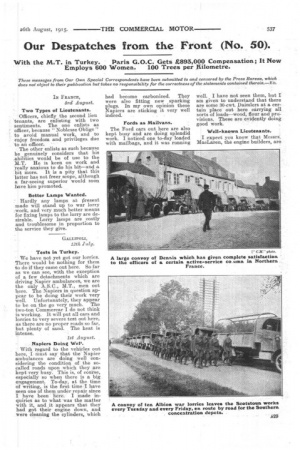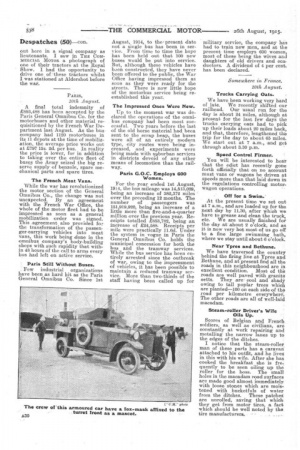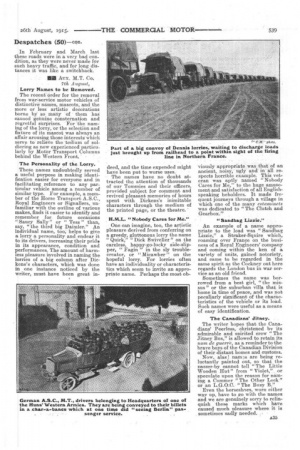Our Despatches from the Front (No. 50).
Page 7

Page 8

Page 9

If you've noticed an error in this article please click here to report it so we can fix it.
With the M.T. in Turkey. Paris G.O.C. Gets £895,000 Compensation; It Now Employs 600 Women. 100 Trees per Kilometre.
These messages from Our Own Special Correspondents have been submitted to and censored by the Press Bureau, which does not object to their publz cation but takes no responsibility for the correctness of the statements contained therein.—ED.
IN FRANCE,
Srd August.
• Two Types of Lieutenants.
Officers, chiefly the second lieu tenants, are enlisting with two sentiments. The one enlists as officer, because "Noblesse Oblige" to avoid manual work and to enjoy freedom and priviYeges due to an officer. •
The other enlists as such because he genuinely considers that his abilities would be of use to the M.T. He is keen on work and really anxious to do his bit—and a bit more. It is a pity that this latter has not freer scope, although a far-seeing superior would soon liave him promoted.
Better Lamps Wanted.
' Hardly any lamps at 5resent made will stand up to war lorry .work, and very much better means for fixing lamps to the lorry are desirable. Lorry lamps are costly and troublesome in proportion to the service they give.
• GALLiPoLi, 12th July.
Tests in Turkey.
We have not yet got our lorries. There would be nothing for them to do if they came out here. So far as we can see, with the exception of a few detachments which are driving Napier ambulances, we are the only A.S.C., M.T., men out here. The Napiers in question appear to be doing their work very well. Unfortunately, they appear to be on the go very much. The two-ton Commercar I do not think is working. It will put all cars and lorries to very severe test out here, as there are no proper roads so far, but plenty of sand.. The heat is intense.
1st August.
Napiers Doing Well.
• With regard to the vehieles out here, I must say that the Napier ambulances are doing well considering the condition of the socalled roads upon which they are kept very busy. This is, of course, especially so when there is a big engagement. To-day, at the time Of writing, is the first time I have seen one of them under repair since I have been here. I made inquiries as to what was the matter with it, and it appears that they had got their engine down, and were cleaning the cylinders, which had become carbonized. They were also fitting new sparking plugs. In my own opinion these Napiers are sticking it very well indeed.
Fords as MaiIvans.
The Ford cars out here are also kept busy and are doing splendid work. I noticed one to-day loaded with mailbags, and it was running well. I have not seen them, but I am given to understand that there are some 30-cwt. Daimlers at a certain place out here carrying all sorts of loads—wood, flour and provisions. These are evidently doing good work.
Well.-known Lieutenants.
I expect you know that Messrs'. MacLaren, the engine builders, are out here in a signal company as lieutenants. I saw in TER Comemaciae Moroa a photograph of one of their tractors at the Royal Show. I had the opportunity to drive one of these tractors whilst I was stationed at Aldershot before the war.
PARIS, 10th August.
A final total indemnity of 2893,488 has been accepted by the Paris General Omnibus C.o. for the motorbuses and other material requisitioned by the French War Department last August. As the bus company had 1120 motorbuses in its 11 depots at the time of mobilization, the average price works out at £797 15s. 2d. per bus. In reality the price is tower, for in addition to taking over the entire fleet of buses the Army seized the big reserve supply of benzole, spare mechanical parts and spare tires.
The French Meat Vans.
While the war has revolutionized the motor section of the General Omnibus Co., the change was not unexpected. By an agreemeut with the French War Office, the whole of the motor fleet had_ to be impressed as soon as a general. mobilization order was signed. This .agreement also provided for the transformation of the passenger-carrying vehicles into meat vans, this work being done in the omnibus company's body-building shops with such rapidity that within 48 hours of the call to arms every bus had left on active service.
Paris Still Without Buses.
Few industrial organizations have been as hard hit as the Paris General Omnibus Co. Since 1st August, 1914, to thepresent date not a single bus has been in service. From time to time the hope has been held out that 100 new buses would be put into service. But, although these vehicles have been constructed, they have never been offered to the public, the War Office having impressed them as soon as they were ready for the streets. There is now little hope of the motorbus service being reestablished this year.
The Impressed Ones Were New.
Up to the moment war was declared the operations of the omnibus company had been most successful. Two years before the last of the old horse material had been sent to the scrap heap, the buses were all of an entirely modern type, city routes were being increased, and experiments were being made with pburban services in districts devoid of any other means of locomotion than the railway.
Paris G.O.C. Employs 600 Women.
For the year ended 1st August, 1914, the bus mileage was 14,513,029, being an inereeee of 382,372 miles over the preceding 12 months. The number of passengers was 151,919,920, being an increase of a little more than five-and-a-quarter million over the previous year. Receipts totalled £853,782, being an increase of 224,588. Receipts per mile were practically 11.6d. Under the system in vogue in Paris the General Omnibus Co. holds the municipal concession for both the bus and the tramway services. While the bus service has been entirely arrested since the outbreak of war, owing to the impressment of vehicles, it has been possible to maintain a reduced tramway service. More than two-thirds of the staff having been called up for military service, the company has had to train new men, and at the present time employs 600 women, most of these being the wives and daughters of old drivers and conductors. A dividend of 4 per cent. has been declared.
Somewhere in. France.
10th August.
Trucks Carrying Oats.
We have been working very hard of late. We recently shifted our railhead. Our usual run for the day is about 24 miles, although at present for the last few days the trucks carrying oats had to pick up their loads about 20 miles back, and that, therefore, lengthened the trip for the day to about 65 miles. We start out at 7 a.m., and get through about 3.30 p.m.
Speed Control Firmer.
You will be interested to hear that the edict has recently gone forth officially that on no account must vans or wagons be driven at speeds more than that laid down in the regulations controlling motorwagon operations.
• Off for a Swim.'
At the present time we set out at 7 a.m., and are loaded up for the next day by 11.30, after which we have to grease and clean the truck, etc. We are usually finished for the day at about 2 o'clock, and as it is now very hot most of us go off to a fine large swimming bath, where we stay until about 6 o'clock.
Near Ypres and Bethune.
We have traversed the country behind the firing line at Ypres and Bethune, and at present find all the roads in this neighbourhood are in excellent condition. Most of the roads are well paved with granite setts. They are cool and shadY owing to tall poplar trees which are planted-100 on each side of the road per kilometre everywhere. The other roads are all of well-laid macadam.
Steam-roller Driver's Wife Oils Up.
Scores of Belgian and French soldiers, as well as civilians, are constantly at work repairing and metalling the narrow lanes up to the edges of the ditches.
I notice that the steam-roller man of these parts has a caravan attached to his outfit, and he lives in this with his wife. After she has cooked the breakfast she is frequently to be seen oiling up the roller for the boss. The small holes in the macadam road surfaces are made good almost immediately with loose stones which are moistened with bucketfuls of water from the ditches. These patches are unrolled, saving that which they get from motor tires, a fact which should be well noted by the
tire manufacturers, •. In February and. March last these roads were in a very bad condition, as they were never made for such heavy traffic, and foilong distances it was like a switchback.
11111 Aux. M.T. Co. 7th August, Lorry Names to be Removed.
The recent order for the removal from warserviee motor vehicles of distinctivenames, ndascots, and the more or less artistic decorations borne by so many of them hag caused -gen-ill/1e consternation and regretful surprises. For the naming of the lorry,-or the selection and fixture of its mascot was always an affair arousing those interests which serve to relieve the -tedium of soldiering as now experienced particularly by Motor Transport Columns behind the Western Front.
The Personality of the Lorry.
These names undoubtedly served a useful purpose in making identification easier for everyone and in facilitating reference to any particular vehicle among a number of similar type. For example, a member of the Horse Transport A.S.C., Royal Engineers or Signallers, unfamiliar with the outline of various makes, finds it easier to identify and remember for future occasions "Saucy Sally" or " Tess " than, say, "the third big Daimler." An individual name, too; helps to give a lorry a personality and endear it to its drivers, increasing their prida in its appearance, condition and performances. The amount of harmless pleasure involved in naming the lorries of a big column after Dickens's characters, which was done in one instance noticed by the writer, must have been great in
deed, and the time expended might have been put to worse uses.
• The names have no doubt attracted the attention of thousands of our Tommies and their officers, provided subject for comment and revived pleasant memories of hours spent with Dickens's inimitable characters through the medium of the printed page, or the theatre.
H.M.L. "Nobody Cares for Me."
One can imagine, too, the artistic pleasure derived from conferring on a greedy, gluttonous lorry the name "Quirk," "Dick Swiveller " on the careless, happy-go-lucky side-slipper, " Fagin " in the sly troublecreator, or " Micawber ' on the hopeful lorry. For lorries often have an individuality or characteristics which seem to invite an appropriate name. Perhaps the most oh
viously appropriate was that of an ancient, noisy, ugly and in all respects horrible example. This veteran was aptly named. "Nobody Cares for Me," to the huge amusement and satisfaction of all Englishspeaking beholders. It made frequent journeys through a village in which one of the many estaminets was dedicated to "The Clutch and Gearbox."
"Sandbag Lizzie."
An example of a name appropriate to the load was "Sandbag Li2zie," a Straker-Squire which, roaming over France on the business of a Royal Engineers' company and coming within the ken of a variety of units, gained notoriety, and came to be regarded in the same spirit as the Cockney out here regards the London bus in war service as an old friend.
Sometimes the name was borrowed from a best girl, "the missus " or the suburban villa, that is borne in time of peace, and was not peculiarly significant of the characteristics of the vehicle or its load. Such names were useful as a means of easy identification.
The Canadians' Jitney.
The writer hopes that the Canadians' Peerless, christened by its admirable and spirited crew "The Jitney Bus," is allowed to retain its nom de guerri,, as a reminder to the brave boys of the Canadian Division of their distant homes and customs.
Now, alas ! nam-?s are being reluctantly painted out, so that the Passer-by cannot tell "The Little Wooden Hut from "Violet,".. or speculate upon the reason for naming a Cramer "The Other Lock"
or an "The Busy B."
Even the horseshoes, worn either way up, have to go with the names and we are genuinely sorry to relinquish these marks which have caused much pleasure where it is sometimes sadly needed.






















